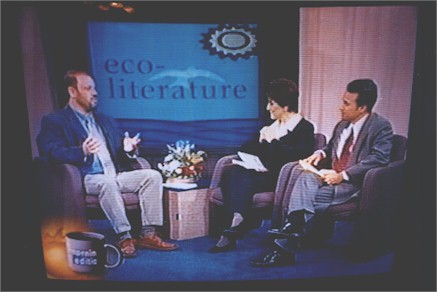Since his interests span several disciplines, Professor Morano is happy to visit classes that cover English, science, film, and journalism during a single school visit. Professor Morano is happy to do any or all of the workshops described below during a visit. And, of course, if there is another direction or a specific topic that you'd like him to address, he is always open to that.
To schedule or to discuss conditions, please contact the author directly.
Phone: 732-571-4424
Fax: 732-571-3609
Email: Morano@monmouth.edu
The Eco-Adventure Series
The books of John Morano’s Eco-Adventure Series are an enriching addition to a classroom curriculum for young adults and others. Beyond their literary value, the books incorporate principles from the sciences, biology, and ecology, as well as life lessons and moral issues.
The novels are best read as a series, but are also quite able to stand alone, with no single volume overly dependent on what precedes or follows it. Main characters tend to change from book to book, while lesser characters become more integral to the story. This structure gives the series continuity, but keeps the settings, plots, and characters fresh and unique.
For classes/schools that are not only interested in hearing about the author's work but would also like a hands-on workshop, Professor Morano is happy to conduct an informative lecture on the journalistic "5w's." Students are asked to identify an endangered animal or perhaps an imperiled habitat. This can also be done prior to the author's visit. The students are guided through the use of the 5w's to illustrate the elements of a story. They identify characters (who), problems (what/why), and timelines (when), and discuss settings (where) and solutions (how). When the lesson is completed, students have a deeper understanding of how to build a story, a greater sense of journalistic structure, a clearer view of how literature and journalism can work together, and are well on their way to writing their own eco-story. Professor Morano is happy to tailor this lesson to a variety of audiences and abilities, from elementary to graduate students.
A special rate, 50% off the cover price plus shipping, is available for the purchase of books directly from Orchard House Press. Place your order at orders@orchardhousepress.com or call 360-769-7174.
Don’t Tell Me the Ending! An Introductory Text for Aspiring Film Critics
This how-to text for aspiring film critics examines the process of viewing films with the intent of producing written reviews. Readers will see how reviews can be structured and what elements these columns might contain or comment on. There is information about planning your career as a film critic, elements of the production worthy of consideration, how to gather your material, how to cover theater, ethical concerns, and other practical advice.
For classes that have an interest in the cinema, Professor Morano conducts workshops that illustrate how to evaluate films as a professional critic. He will list the various elements of production that one might comment on; provide insight on what makes a good film good, or a bad film bad; and outline the movements of a typical review, from lead to closing.
The Orchard House Press 50% discount for direct orders applies for this textbook as well. Place your order at orders@orchardhousepress.com or call 360-769-7174.
A Pictorial Guide to Late Cretaceous Fossils of the Atlantic Coastal Plain
Co-authored with Dr. Jim Brown and Ralph Johnson, this reference work contains over 300 professionally photographed museum quality fossils from the late Cretaceous Period. Most of the specimens are from marine environments, including examples of reptiles and dinosaurs that roamed the shoreline. The majority of the specimens were gathered in south/central New Jersey, while others were found in Maryland, Delaware, New York, and other locales. Many of the examples have never appeared in books before. Publication of this book is pending.
For those who have an interest in Professor Morano's paleontolgical efforts, the author is happy to bring wonderful examples of museum quality fossils found in New Jersey and other locales. He enjoys doing hands-on discussions of how to gather, condition, and understand fossils. If the classes aren't too large, he might even be able to provide a fossil for every student to take home.
Copyright 2016 John Morano • All rights reserved
Resources for Educators
Classroom Visits
John Morano is available for classroom visits and speaking engagements on a variety of topics. The author is Professor of Journalism at Monmouth University, with over 20 years' experience. He is a certified teacher who has won The Distinguished Faculty Award, The Celebration of Teaching Award, and five consecutive Student Choice Awards. He is quite comfortable in the classroom or on stage and has the ability to engage a wide variety of audiences.

